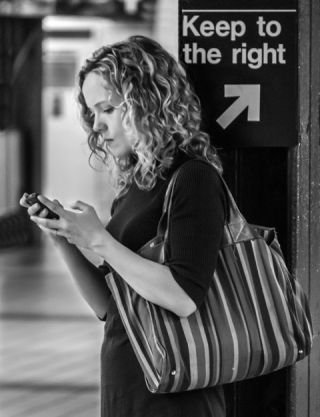
I hear so many stories from young people’s experience with online dating, and now particularly with the new apps like Tinder. We older and maybe maybe not wiser folks wonder what it is like to enter this dating world. Does it breed romance? What about intimacy, nonverbal cues, poetry?

So I asked Emily Jackson, a Millenial and writer, if she would be interested in describing her online experiences. Much in the spirit of clarify things for herself and hopefully helping others, she offered this story:
Trying a Little Tinderness
Like many single millennials, my search for romance led me to the world of online dating not because it’s a healthy place to meet people, but because there seemed like few alternatives. In the last two years the dating app Tinder has become one of the most popular online dating platforms in the world, fostering over 12 million matches, and processing close to a billion swipes per day (yes, one billion). That’s a lot of potential partners to hold in the palm of your hand.
I had tried other sites with varying degrees of success, and found they fell into two camps: those that made me feel in control, and those that did not. On OkCupid, firmly in the second category, I felt powerless. I had no control over who contacted me, and when I was contacted I often felt obligated to respond. It didn’t help that guys could see when I chose not to message them back, and they often sent me rude messages when I abstained from responding. It was like being out at a bar, except that at this bar the quantity of single men was multiplied ten-fold and their hobbies were laid out in bullet points.
Tinder, on the other hand, is fundamentally different. You can only communicate with someone if you have matched, meaning you both swiped right to “like” the other person. The feelings of obligation and anxiety that, for many women, accompany refusing a man were eliminated. I felt physically safe, and I wasn’t hurting anyone’s feelings because these men didn’t know I was saying no. I could take back the power of refusal with seemingly no consequences.
At first Tinder was just a fun social experiment - a game to play with my lady friends on a Saturday night with the prize being a potential fling with a cute boy. As I had also just gotten out of a significant relationship, there was the added benefit of boosting my newly single ego. I quickly realized, however, that Tinder had the potential to serve another purpose: I could use it to play out my insecurities about men.
My teenage years had been fraught with unrequited “love,” and my only serious relationship had left me feeling increasingly small. Tinder therefore also provided a safe space in which I could play out the experiences that had previously left me feeling insecure, powerless, and manipulated. The woman who, as a teenager, didn’t know how to say no or when to speak up for her own desires was now sticking her toe in the waters of self-assuredness. I found myself saying no to people I didn’t want to spend time with. I asked for what I wanted in the bedroom. I did my best to present my true self, and highlighted the elements of myself I was most proud of (like my deep love of Harry Potter). I was surprised to find that my confidence and frankness was frequently rewarded with interest, and when it wasn’t, I was able to walk away. It was a revolutionary experience.
That being said, I was hardly a maneater. I still cried after unsatisfying dates, and worried when boys took hours to text me back. I still longed for a meaningful connection with another human. But I was teaching myself to recognize each date as a learning experience, and more importantly an exercise in self-love. I could feel myself getting bigger in my own life, and it felt empowering to take ownership over my own self-worth.
However, after eight months of swiping this way and that, of becoming proficient in the art of witty banter and suggestive puns (note to self: must add to resume), I found myself struggling to articulate what wasn’t working for me. Sure, I hadn’t secured myself a committed partner, but that wasn’t what was bothering me. I had never been particularly hopeful that Tinder would procure such an individual. The reality was I had reached the point where I was no longer learning anything new about myself, and once Tinder’s utility was stripped away, there was nothing left but superficiality.
The safe space that had felt so comforting to me when I first started using Tinder suddenly became precisely what was frustrating about it. I realized that Tinder had felt safe because the exchanges were happening in an imaginary space between texts and swipes, and the lack of consequences had made it easy for me to be honest about my intentions. But ultimately that space and those interactions weren’t real, and there was no way of distinguishing between the genuine connections and the illusion of them. All interactions felt empty.

More importantly, I now realize that I was contributing to the emptiness that I found so frustrating. Wasn’t I the perfect example, using the platform for my own personal growth and not as a means of connecting with other people? And if most users are similarly playing out their own narratives, spinning their own tales of conquest and woe, then the true connections will be rare at best.
I suppose the real question is which came first? Does the very nature of the online imaginary space flatten human intimacy into superficial exchanges, or is the lack of meaning merely a manifestation of my generation’s self-absorption and inability to connect? Neither is particularly comforting, and yet I feel the lack of alternatives acutely. Must we just keep trying to make the online world work for us, turning to selfish ways of extracting meaning, or is it time to recognize that ease of access to partners has no relation to the depth of those connections. For now, I’m turning towards the latter. But who knows how I’ll feel in a month or two - I might be lonely and turn to the easiest way to get a little tinder loving care.



